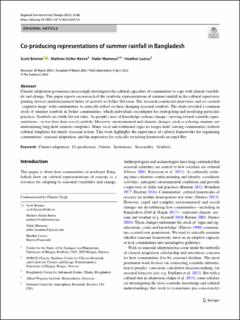Co-producing representations of summer rainfall in Bangladesh
Journal article, Peer reviewed
Published version

Åpne
Permanent lenke
https://hdl.handle.net/11250/3075457Utgivelsesdato
2023Metadata
Vis full innførselSamlinger
Sammendrag
Climate adaptation governance increasingly investigates the cultural capacities of communities to cope with climate variability and change. This paper reports on research of the symbolic representations of summer rainfall in the cultural repertoires guiding diverse institutionalised fields of activity in Sylhet Division. The research conducted interviews and co-created ‘cognitive maps’ with communities, to critically reflect on their changing seasonal symbols. The study revealed a common stock of summer symbols in Sylhet communities, which individuals reconfigure for strategizing and justifying particular practices. Symbols are stable but not static. As people’s uses of knowledge systems change—moving toward scientific representations—so too does their use of symbols. Moreover, environmental and climatic changes, such as a drying summer, are undermining long-held semiotic templates. Many local and traditional signs no longer hold, leaving communities without cultural templates for timely seasonal action. This work highlights the importance of cultural frameworks for organising communities’ seasonal adaptation, and the imperative for critically revisiting frameworks in rapid flux.
